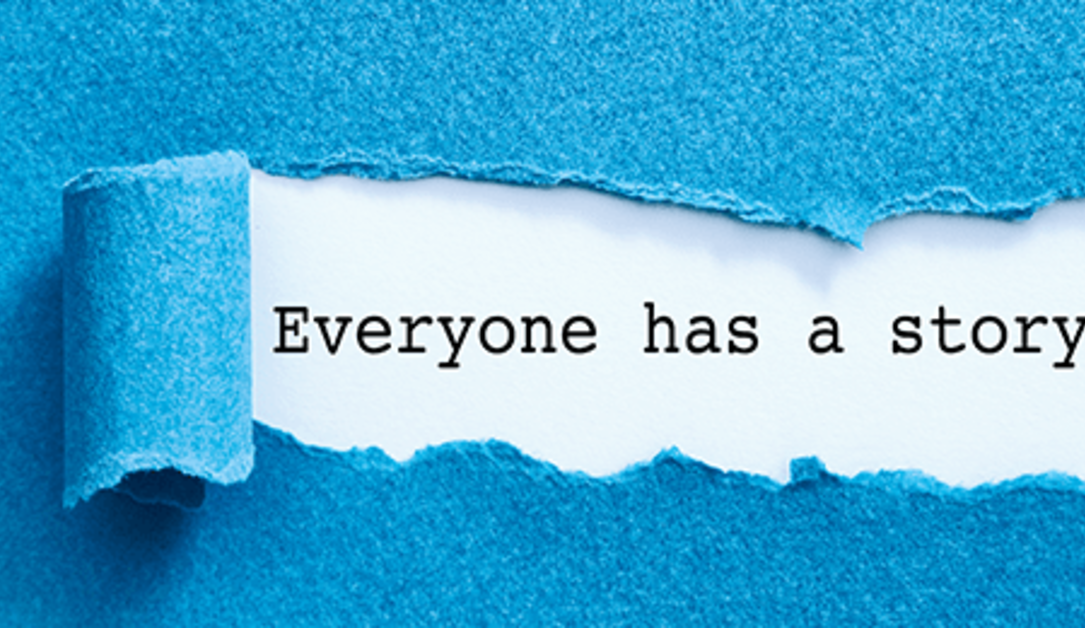The challenge: Life narrative
Have you ever stopped to consider why "story" means so much to us?
Why do great books and great movies enrapture us the way they do?
When you pick up your empty popcorn bag and slowly—almost mournfully—make your way out of the theater, or when you lay down a dearly loved book after you turn the last page, the deep sense of longing you experience suggests that we crave far more than entertainment.
In A Million Miles in a Thousand Years Donald Miller writes about the parallels between storytelling and living, teaching that the elements that make a story compelling are the same elements that comprise a meaningful life. It's all in the way we are wired.
In a sad yet hopeful observation, he wrote about the disappointing "stories" that so many of us "tell" the world through our lives:
"We live in a world where bad stories are told, stories that teach us life doesn't mean anything and that humanity has no great purpose. It's a good calling, then, to speak a better story. How brightly a better story shines. How easily the world looks to it in wonder. How grateful we are to hear these stories, and how happy it makes us to repeat them."
It's probably safe to say that we all desire to live life well and that we all too easily lose sight of how to do it. We have a spiritual need for meaningful narrative to remind us of the potential we have to offer the world through our lives. And there is something unique to the written word that allows you, as a reader, to pore over sentences and soak through their layers of meaning. Or perhaps it is the story soaking through you.
The hope: Soaking in good words
Eugene H. Peterson, best known for translating (from its original languages) the easily relatable version of the Bible known as The Message, also authored a book titled Eat This Book: A Conversation in the Art of Spiritual Reading. As the title suggests, it provides a lot of insight into how we can intentionally read the extraordinary stories recorded in Scripture and some carefully chosen works of literature to nourish our souls.
Peterson opens his book with a portrayal of the way his dog acts with a bone and relates that image to something that excited him in the prophet Isaiah's poetic description of a lion growling over its prey:
"What my dog did over his precious bone, making those low throaty rumbles of pleasure as he gnawed, enjoyed, and savored his prize, Isaiah's lion did to his prey. The nugget of my delight was noticing the Hebrew word here translated as 'growl' (hagah) but usually translated as 'meditate.'
"Hagah is a word that our Hebrew ancestors used frequently for reading the kind of writing that deals with our souls. But 'meditate' is far too tame a word for what is being signified. When Isaiah's lion and my dog meditated they chewed and swallowed, using teeth and tongue, stomach and intestines. There is a certain kind of writing that invites that kind of reading, soft purrs and low growls as we taste and savor, anticipate and take in the sweet and spicy, mouthwatering and soul-energizing morsel words. I am interested in cultivating this kind of reading."
Who doesn't want to cultivate that kind of reading? The best way to do it is to read while being mindful of the effects the books can have on you and to choose carefully the stories upon which you will focus. As writer and poet Oscar Wilde stated, "It is what you read when you don’t have to that determines what you will be when you can't help it."
What goes in will, in some form or another, eventually make its way out, so choose to dwell on brave, hopeful, challenging and heroic stories.
Choose to read fantasy, knowing that God is more creative, more powerful and more wonderful than anything we could hope for or imagine. Read biographies, knowing that God became a man so we could understand him more fully. Each person, made in the image of God, reflects something unique about his character. Read history, knowing that countries have "souls" of their own and that God places groups of people in certain periods, in certain cultures, to fill roles in the epic story he is authoring. Read memoirs, knowing God is at work in every life, trying to draw each one of us toward himself, using the hard things and the joyous moments alike to strengthen us for eternity.
If you are interested in compiling a strong and spiritually nourishing summer reading list for you or your family, we offer a few suggestions:
The Chronicles of Narnia by C.S. Lewis is an incredible allegory for the way God interacts with the universe. Though you may have read the series as a child, the spiritual meaning in Lewis' writing expands as your faith grows. These books are worth reading a hundred times over, no matter what age you are.
One Thousand Gifts by Ann Voskamp is an astonishing account of how practicing gratitude dramatically altered her perception of life. The vulnerability she displays in her writing, combined with her poetic prose and wise insight, makes her book fiercely powerful, especially for anyone wrestling with discontent or painful memories.
A Million Miles in a Thousand Years, which we referenced and quoted earlier, is Donald Miller's memoir about how the process of turning another one of his books into a movie helped him understand the structure and design of human life. It expounds upon the idea that God is like an author who gave his characters the ability to create even as he created them.
Unbroken by Laura Hillenbrand details the hellish personal story of World War II prisoner of war Louis Zamperini. In so doing, it reveals that the human spirit is capable of surviving unimaginable physical and psychological suffering. The book does not stop with Zamperini's liberation from his captors, but rather peaks and inspires most when Ms. Hillenbrand shares how the love of Christ can liberate one from the nightmares of a painful past and the all-consuming hatred and desire for revenge toward those who have harmed us.
Then there is the book of Job from the Bible, which is rich on so many levels that Hillsdale College (a fine institution with which Rebecca is honored to work) has included a study of the ancient work in the college's Great Books 101 online course, calling it a "literary and theological masterpiece." The essence of Job’s story is man's struggle to walk in faith, believe that God is just and accept our absolute need for humility and divine wisdom. Particularly poignant and powerful are the heart-stopping and inspiring passages in which God confronts Job’s doubts with thundering questions such as, "Where were you when I laid the foundations of the Earth? Tell me, if you know!"
Whatever intellectually or spiritually nourishing books you decide to read, stay with them long enough to chew, savor and fully digest their words and messages. Then let them drive you into living a better story.
First appeared in The Washington Times











